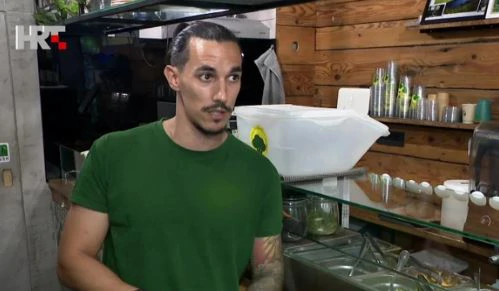In the last three years, about 30 thousand Croats who had previously lived and worked abroad have returned to Croatia, according to the Croatian Bureau of Statistics. After returning, they most often open crafts or companies in construction, service and technical sectors – using various measures and programs for returnees.
Matej Vrdoljak has lived abroad for the past 12 years – in Canada for a year, and since 2014 in Ireland, where he met his wife Kate. A year and a half ago, they replaced Dublin with Osijek.
“We talked about how we wanted to open our own ‘cafe’, let’s say a restaurant. That encouraged us, and my wife even wanted to come a year earlier because she had never lived outside of Ireland. She wanted to get to know a new culture and way of life,” said Matej Vrdoljak.
He worked in the catering industry for years, and after returning, he opened a health food store with his wife. Their arrival especially pleased Matej’s mother Marijana Vrdoljak.
“We couldn’t believe it, we were overjoyed, because he hadn’t lived with us for a long time. He was away from home for eleven years, so I don’t think we could have been happier,” she said.
Cost of living the reason for returning
Dragica Kolarević also returned from Germany a year ago. She lived there for two years, doing administrative work. She missed her family, and the cost of living was increasing.
“Apartments are expensive, services are expensive, and when I calculated it all, I saw that it wasn’t a significant difference to leave all this behind,” said Kolarević, who, like Matej, opened a business upon her return.
Measures for returnees
The self-employment measure “I choose Croatia” implemented by the Croatian Employment Service helped them with this. So far, more than 1,100 returnees have used it.
Ivana Mehle, Deputy Director of the Croatian Employment Service, explained: “As for returnees from abroad, the maximum amount available to them this year is 27 thousand euros. If we talk about our internal mobility beneficiaries, they have 23 thousand euros available to them.”
The Ministry of Demography emphasizes that other measures are also available to returnees: exemption from income tax for five years and measures for housing care.
“This draft Act on Housing Care in Supported Areas provides access to the housing fund for Croatian returnees, which is a truly significant step forward,” emphasized Ivana Perkušić, Head of the Immigration Directorate at the Ministry.
According to data, around 10 thousand returnees return to Croatia annually.
Source: HRT
